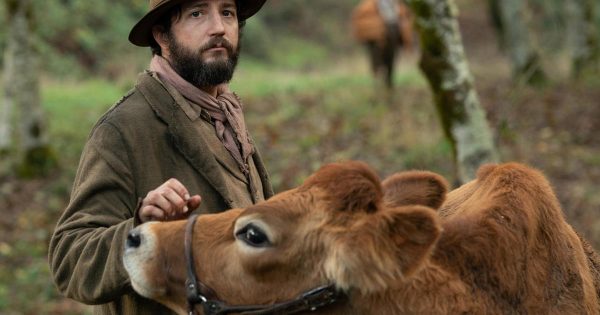Film Review: “First Cow” — A Bovine Tour de Force
By Tim Jackson
Marvelously acted and directed, First Cow is a masterpiece that dramatizes how struggle and adversity are part of the human comedy.
First Cow, directed by Kelly Reichardt. Screening at Kendall Square Cinema and Coolidge Corner Theatre.

John Magaro in a scene from First Cow.
Director Kelly Reichardt’s First Cow begins with a quotation from William Blake’s The Marriage of Heaven and Hell: “the bird a nest, the spider a web, man friendship.” Those words also serve as the epigraph for the novel from which the film is adapted, The Half Life by Jonathan Raymond. The latter frequently works with Reichardt, who has drawn on his short stories several times. Blake’s sentiment connects the idea of home in the natural world with humanity’s primal need for connection. These are familiar themes for Raymond and Reichardt: Old Joy and Night Moves revolve around man’s respect for nature; the complexities of community are at the core of Wendy and Lucy and Certain Women. Meek’s Cutoff, set in the 1840s, is rich in period detail. First Cow knits together all of these concerns (friendship, humanity’s bond with the natural world) in a historical fiction about the American spirit of self-invention and free enterprise.
As the film begins, a woman (Alia Shawkat) foraging in the forest comes upon a skull buried in the ground. Brushing back the dirt, she sees two skeletons worn clean by time. She looks skyward. We cut back to a pair of hands foraging mushrooms, but it is now 1820. Cookie (John Maguro) chef for a small band of ragged trappers in the Pacific Northwest, is hunting for food. He hears a voice. Fearing it may be a hostile Indian, he approaches cautiously and discovers, naked in the bushes, King-Liu (Orion Lee), who has escaped his Russian captors. Cookie offers Lui a blanket and, to avoid the objections of his rougher compatriots, smuggles Lui in among the cooking supplies. The plan is to wait until the “Chinaman” can escape.
We next meet Cookie at the Royal West Pacific Trading Post after he has left his compatriots. He runs into Lui, and the two outsiders form a strong friendship. Lui embodies the immigrant spirit; Cookie dreams of one day becoming a chef in San Francisco. They retreat to Lui’s remote cabin, where, in a parody of pioneer domesticity, Lui cuts wood as Cookie sweeps and cooks. One evening, while talking about their ambitions, Cookie shows off his cooking skills. He fries up donut-like cakes using milk stolen from a cow owned by the wealthy British governor, Chief Factor. Factor, played by the diminutive British actor Toby Jones, has the only cow in the area. She is tied to a tree on his property; Factor awaits the delivery of a first bull. Liu recognizes a lucrative business opportunity. The two men begin to sneak out at night to secure their “secret ingredient.” Lui, perched in a tree, acts as a lookout while Cookie milks the beast. Sure enough, the cakes are a big hit at the trading post. Despite the danger of coming up with the milk needed for the pastries, Lui insists they continue before the inevitable arrival of the bull. Factor, impressed by the cakes, suggests the two cater at his home where he is tossing a party for “the Captain,” played by Scott Shepherd. They can’t refuse; hovering at the back of our minds is the earlier vision of the two unidentified skeletons.
Of course, trickery and competition are an integral part of the entrepreneurial spirit, which draws on a democratic impulse to outwit the status quo. The immigrant and the pioneer are determined to create a better life for themselves. The aptly named “Chief” and “Captain” make it clear that, regarding the American dream, authority and status must be reckoned with. Throughout the narrative, Reichardt and Raymond effortlessly weave together elemental conflicts — nature vs. civilization, authority vs. ambition, and honor vs. survival.
This imaginative comic folktale, a wry celebration of the American entrepreneurial spirit, riffs on history, fate, and the fleeting nature of existence. The era is powerfully evoked pictorially: the cast members look and dress as if they’ve long lived outside the boundaries of civilization. The story unfolds at an unhurried pace, giving us time to soak up what life was like in the rough outback. Every frame is chockablock with various textures: crude wooden houses, old women sweeping straw brooms across floorboards, a fiddler sawing out a tune, gamblers, bullies, a child at work carrying a pail (of milk?). Each figure hopes to build a tolerable life in a wilderness that threatens as often as it solaces. Man’s (and woman’s) relationship to nature is symbiotic, seesawing between hope and struggle.
Marvelously acted and directed, First Cow is a masterpiece that dramatizes how struggle and adversity are part of the human comedy. Life is noble but ephemeral. No individual’s story is more or less worthy of our attention and respect — a powerful message for our deeply, deeply troubled times.
Tim Jackson was an assistant professor of Digital Film and Video for 20 years. His music career in Boston began in the 1970s and includes some 20 groups, recordings, national and international tours, and contributions to film soundtracks. He studied theater and English as an undergraduate, and has also has worked helter skelter as an actor and member of SAG and AFTRA since the 1980s. He has directed three feature documentaries: Chaos and Order: Making American Theater about the American Repertory Theater; Radical Jesters, which profiles the practices of 11 interventionist artists and agit-prop performance groups; When Things Go Wrong: The Robin Lane Story, and the short film The American Gurner. He is a member of the Boston Society of Film Critics. You can read more of his work on his blog.

